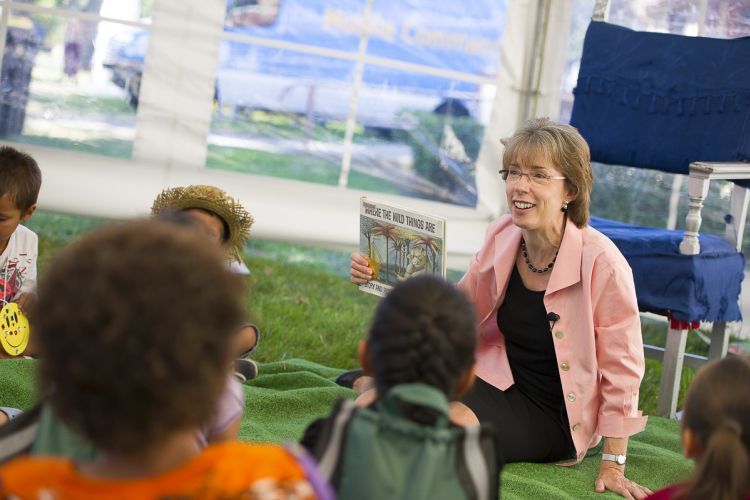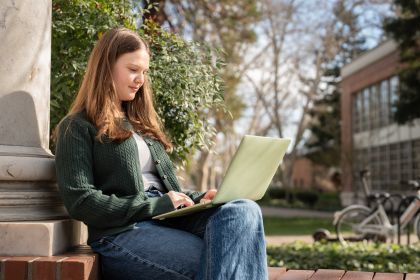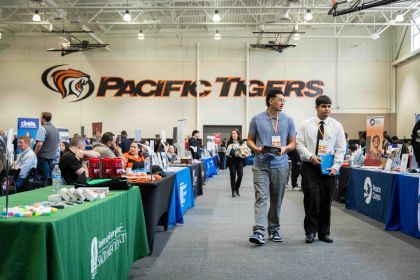Breadcrumb
Pacific’s Beyond Our Gates celebrates 10-year anniversary

Retired university President Pamela Eibeck, the founder of Beyond Our Gates, was among those who spoke at a virtual celebration of the milestone on Nov. 16
University of the Pacific’s Beyond Our Gates initiative, a community outreach effort focused on improving education and quality of life in Stockton and San Joaquin County, reached its 10th anniversary in early November.
Retired university President Pamela Eibeck, the founder of Beyond Our Gates, was among those who spoke at a virtual celebration of the milestone on Nov. 16.
Beyond Our Gates consists of more than 90 community members who collaborate on issues and opportunities involved with early-childhood literacy.
Beyond Our Gates published a 2020 impact report to highlight the program’s initiatives and accomplishments over the past decade.
“Let’s keep the momentum going. Let’s keep kids attending school, and keep putting books in the hands of young children,” Eibeck said. “Let’s keep helping parents learn how to help their children read.”
“Today, in this new and unpleasant COVID era, so many vulnerable kids for whom online learning does not work are getting left behind in spite of the best efforts of teachers. We must continue to help them.”
“Pam has made invaluable and indelible contributions both to our university and our community,” Pacific President Christopher Callahan said. “Pam, we want to thank you for all you have done and continue to do.”
Since 2012, Beyond Our Gates has focused on grade-level reading by third grade in Stockton and San Joaquin County elementary schools. Research has shown that prior to third grade students learn to read; after third grade, they read to learn. If they are lagging behind as third graders, many have problems throughout their education.
Jennifer Torres, former Pacific community relations director, helped develop many of Beyond Our Gates’ programs. She now works for California Institute of Technology and is a children’s book author.
“The fact that all of us can gather today, 10 years later, I think speaks to this idea that we were not looking for a quick fix (with Beyond Our Gates),” Torres said. “We are looking for transformational change and a new way of coming together to collectively address a community’s challenge.”
Torres noted that when Beyond Our Gates was launched, just over 40% of local parents read to their preschoolers every day. According to the California Health Information Survey, that figure is now 57%.
“There is room to grow, but to me that is impressive and it speaks to reading as a habit and a community value,” Torres said.
The impact report includes information on other Beyond Our Gates’ successes:
· Improved grade-level reading by third grade, from 27% in 2016 to 41% in 2019;
· More than 43,000 students with perfect attendance during the 2019 Every Day Counts attendance challenge (held during September);
· A total of $325,000 in mini grants to local agencies focusing on early-childhood literacy.
Dave Frederickson and Bob Benedetti, who helped lead the Jacoby Center’s efforts during the formative years of Beyond Our Gates, also attended the celebration. They recalled the “listening tour” – a series of forums focused on community issues including education, the economy and the environment as part of the assessment work for Beyond Our Gates.
“We sought to take a snapshot of where the community was and what the issues were that we needed to be focused on,” Frederickson said.
“From the beginning, we were able to involve our students in organizing the program,” said Benedetti, who also served as dean of College of the Pacific. “Much of the early success of the program was because of the work of students.”
Mike Klocke, Pacific community relations director, noted that the COVID-19 pandemic has caused some disruptions in usual Beyond Our Gates projects, including the cancellation of the 2020 attendance challenge.
Beyond Our Gates recently awarded $75,000 in mini grants and has held public forums dealing with school closures, remote learning and public health issues during the pandemic.





